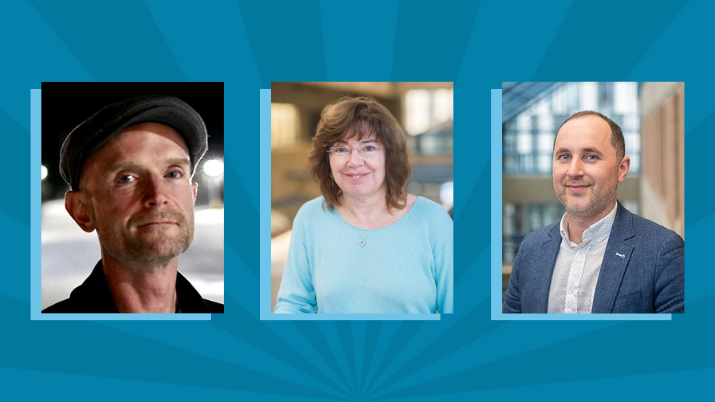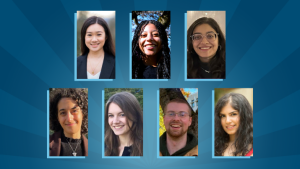

Join us to congratulate our graduating Psychology students who have impacted communities within Arts, at UBC, and beyond!
In 2024, the Faculty of Arts received 102 nominations and celebrate 74 students who have brought forth a wealth of interdisciplinary skills, demonstrating the incredible leadership and capacity our students have to improve their communities and the world.
To learn more about their experiences and reflections as student leaders, we asked the winners and nominees how these opportunities have impacted and shaped their undergraduate journeys in their time as UBC Arts students.
Award Winners
Outstanding Leader in the Faculty of Arts Award
Trinity Stephens, Psychology
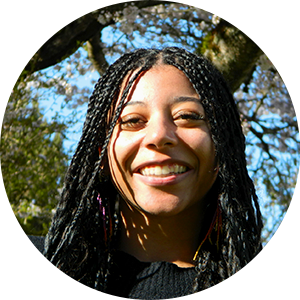
Trinity served as an integral member of the Arts Indigenous Student Advisors (AISA), supporting in the successes of new and continuing First Nations, Métis, and Inuit students. There, she offered guidance and tools for degree planning, academic concessions, and connecting students to on-campus communities.
What student leadership opportunity had the most impact on you during your time at UBC?
While working at AISA, I had the privilege of organizing the Indigenous Mentorship Program, following the successful pilot program from the year prior. Meeting and connecting with incoming and upper-year students felt like a full-circle moment. I saw myself in the first year mentees who were both eager and shy. The mentorship program provided the mentees a space to be curious, gain guidance, and have support while transitioning into university. I was able to let my leadership skills shine, while offer valuable tips and advice. At AISA, I was also able to collaborate with GoGlobal, welcoming exchange students from Australia’s Monash University into Vancouver and the UBC campus this past summer.
What does it mean to be a great Arts student leader?
To be acknowledged for this award is an honour, and the connections I have accumulated in my time at UBC have been an extremely heartwarming experience. To me, being a capable leader is demonstrating the ability to have meaningful and admirable relations with a community or group of people. In this way, I believe good leaders are people who have found a level of respect and acceptance within themselves, so they are able to extend this quality of relationships to others.
What advice would you give to incoming UBC Arts students?
There is so much nature and beauty around us on campus. Check out the xʷc̓ic̓əsəm Garden at UBC Farm, and visit UBC’s Botanical Garden. Walk the Greenhart Treewalk and find time to watch a sunset at Wreck beach!
What did you learn about yourself at UBC?
In my early years at university, I would always fear attending events alone, even the ones that interested me personally. Over the years, I exposed myself to situations where I would attend these events by myself without a friend to accompany me. Those are the times where I have had the most meaningful connections and conversations with new people, and I will always appreciate the opportunities I’ve had to step outside my comfort zone and break out of my shell.
Outstanding Student Leaders in the UBC Community
Viola Chao, Psychology
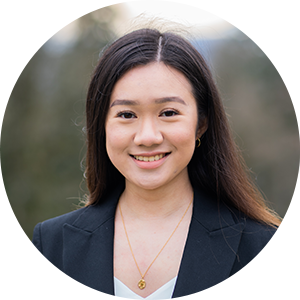
Viola facilitated the creation of the BIPOC Committee within the Arts Undergraduate Society (AUS), embedding principles of Equity, Diversity, and Inclusion (EDI) in all areas of academic, work, and campus life.
She provided academic and wellness support in various campus hubs including UBC’s Wellness Centre and Alma Mater Society.
What student leadership opportunity had the most impact on you during your time at UBC?
My four years as a part of the AUS will always hold a special place in my heart. Joining the Health & Wellness Committee, I eventually went on to serve as Vice-President Academic. I discovered my passion for promoting and advocating health and well-being for equity-seeking communities, particularly through facilitating wellbeing and academic support initiatives aimed at enhancing the Arts student experience. Education is a powerful tool in approaching EDI, which is why my work in spearheading the creation of a BIPOC Committee was especially meaningful as it set the groundwork for creating opportunities for my peers to explore BIPOC advocacy and foster an equitable culture in the Faculty of Arts. Many of the perspectives I’ve gained through the AUS have extended towards my time with the AMS, UBC Wellness Centre, Faculty of Applied Science Professional Development Team, and the Asian Canadian Asian Migration (ACAM) program.
What does it mean to be a great Arts student leader?
There aren’t homogenous definitions of a great Arts student leader. Every student has something valuable to contribute to our community. I strongly believe that keeping an open mind and actively learning from those around you can foster personal growth and expand your perspectives. What has driven my leadership work over the years is my dedication to understanding gaps that we can tangibly fill, while reflecting on how we can collectively do better to meet student needs. Good leadership involves actively considering your access to privilege and your position within social hierarchies. It’s important to reflect on how you could play a role in holding space and uplifting marginalized voices.
What advice would you give to incoming UBC Arts students?
Don’t be afraid to step outside your comfort zone! It’s totally okay if you don’t stick to the plan you may have envisioned or built for yourself. For instance, I discovered my love for ACAM courses late in my degree, which made me wish that I offered myself more flexibility to explore different elective courses, especially during my first and second year. Some of the greatest things that have happened to me at UBC have come spontaneously and unexpectedly!
What did you learn about yourself at UBC?
I’ve realized over the years, work surrounding EDI can be incredibly emotionally laborious, especially because there were times when I felt a sense of responsibility to make a positive impact as a racialized student who had access to these leadership opportunities. As much as I’ve learned my capabilities in channelling my character as an empath towards enacting social change, I’ve also navigated significant periods of burnout and come to know how important it is to meet myself where my mental capacity sees fit. A fundamental aspect of self-empowerment involves actively practicing self-compassion, and acts of self-care can look different depending on the season of life you’re in. I’ve found it helpful over the years to maintain balance by slowing down and checking in on my emotional needs.
What message do you have for your graduating peers?
To my fellow graduating peers, congratulations on achieving this incredible milestone! It’s easy to lose ourselves in our worries about the next chapter of life without realizing that we have reached a time that our past selves have looked forward to, so I hope you can take the time to commend what your perseverance and dedication have brought you. Celebrate the person you have grown into today and take everything you’ve gained from your time at UBC to continue growing into the best version of yourself. I wish you all the best in all of your tomorrows.
Award Nominees
Himali Chhabra, Psychology and Economics
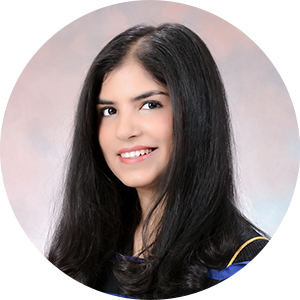
What student leadership opportunity had the most impact on you during your time at UBC?
Leading the UBC Music Initiative as its President hugely shaped my UBC experience. As a singer, music is my joy. I led our team through the transition back to in-person activities post-pandemic. We hosted events that brought students together, fostering a community spirit at a much needed time. Our commitment to giving back to society through events offered comfort to many, including myself.
What advice would you give to incoming UBC Arts students?
Your time at UBC is truly yours to shape. Engage actively—join clubs, attend events and meet new people. Don’t hesitate to create your own path. Invest yourself fully in whatever you commit to; your passion and dedication will shine through. Lastly, be sure to explore UBC’s vast resources like Arts Co-op, entrepreneurship and research opportunities.
Luke Forrester, Honours Psychology

What student leadership opportunity had the most impact on you during your time at UBC?
My work and volunteering at the AMS Sexual Assault Support Centre totally transformed my leadership style. I learned that striving to “prove myself” meant I was role modelling a fear of failure, rather than a love for spiritual growth. By shifting my work ethic to embrace emotional authenticity and collaboration, I was able to learn to lead without relying too much on hierarchy.
What advice would you give to incoming UBC Arts students?
University is as much a place for you to learn about yourself as it is to learn about any academic discipline. Self-compassion will get you further than you think in times of high stress. Stay curious about what you are learning beneath the surface!
Jamie Logue, Psychology
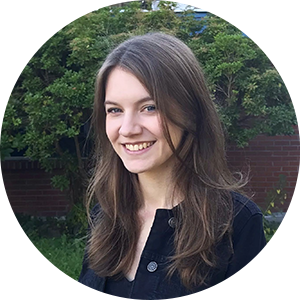
What student leadership opportunity had the most impact on you during your time at UBC?
Being a Totem Park Residence Advisor was the most impactful leadership experience I had at UBC, as this involvement enabled me to connect with so many other incredible student leaders and organizations on campus. Supporting students in their transition to UBC life was not only rewarding, but also helped me better understand the various issues students were facing, which guided me in my future leadership pursuits at UBC.
What advice would you give to incoming UBC Arts students?
Academics are important, but they don’t have to define your experience at UBC. There is a wealth of opportunities available for students to get involved in the broader UBC community and make a positive impact on other individuals. I would encourage new students to seek out involvement opportunities that excite them and remind them that they are more capable and resilient than they might think.
Sushmita Mahadani, Honours Psychology
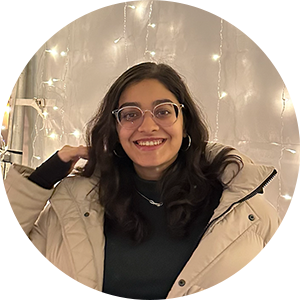
What student leadership opportunity had the most impact on you during your time at UBC?
There is a diverse number of opportunities at UBC that have positively impacted me, such as conducting my honours thesis within the Mental Health Systems and Services Lab, being a Work Learn student in the Department of Psychology, engaging with the arts community as an Arts Peer Academic Coach and Imagine Day Orientation Leader. Additionally, being involved in clubs such as UBC Psi Chi, Campus Lightbox, UBC Launchpad, and the Arts Undergraduate Society also provided me meaningful experiences within a variety of different campus communities.
Golsa Moazedi, Psychology and Law & Society
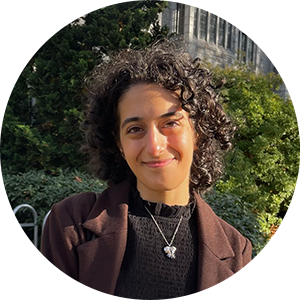
What student leadership opportunity had the most impact on you during your time at UBC?
My 3-year long involvement with the Arts Undergraduate Society (AUS) has been an invaluable part of my UBC experience and has left an incredible impact on me. In my varying positions, from Coordinator to Vice President Internal, I’ve met so many student leaders who also wanted to build a strong community of Arts students and foster bonds. I was able to work alongside my peers to build and grow our vision of a community.
What did you learn about yourself during your time at UBC?
My time at UBC has taught me how capable I am when I push myself beyond my comfort zone. If you had told me in my first year that in the next few years I would be able to speak to over 170 people in a lecture hall, I would have never believed you. I am grateful that I have been able to discover my passion for literature and advocacy during my time at UBC!
Recognized Leaders within the Arts Community
The following graduating students were also recognized by their peers, advisors, mentors, and professors for their extraordinary leadership within the Faculty of Arts.
- Jeremy Cruz, Psychology
- Georgia Krombein, Psychology
Congratulations to out graduating Psychology students for their achievements!
A version of this announcement was originally published on the UBC Faculty of Arts website.
